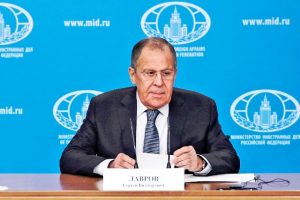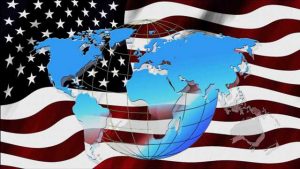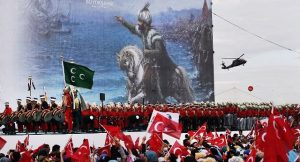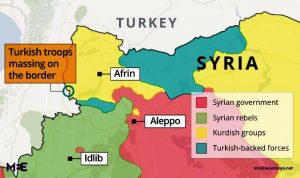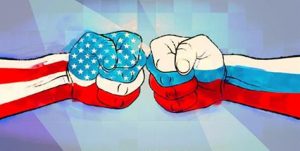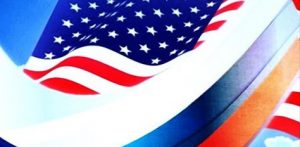LUC MICHEL (ЛЮК МИШЕЛЬ) & EODE/
Luc MICHEL pour EODE/
Quotidien géopolitique – Geopolitical Daily/
2018 01 23/
The emergence of a new multipolar world around the Eurasian unification processes initiated by Moscow (unified Eurasian space) (1) and Beijing (new Silk Roads and OBOR project – One Belt One Road) (2) (3) is at the heart of the “new Cold War” 2.0 “. And explains why and how the US, which intends to make the 21st century a “new American century”, put the fight against this emergence at the forefront of their action …
Vu de Moscou, voici comment le ministre russe des Affaires étrangères Lavrov voit cet affrontement !
* Résumé français :
L’émergence d’un nouveau monde multipolaire autour des processus d’unification eurasiatique initiés par Moscou (Espace eurasiatique unifié) (1) et Pékin (nouvelles Routes de la soie et projet OBOR – One Belt One Road) (2) (3) est au coeur de la “nouvelle Guerre Froide 2.0”. Et explique pourquoi et comment les USA, qui entendent faire du XXIe siècle un “nouveau siècle américain”, ont placé le combat contre cette émergence au premier plan de leur action …
Seen from Moscow, this is how Russian Foreign Minister Lavrov sees this clash!
PART I- EURASIAN INTEGRATION AND WASHINGTON INTERFERENCES
On January 15, 2018, Russia’s Foreign Minister Sergey Lavrov responded to questions from the media at a news conference on RUSSIAN DIPLOMACY IN 2017. During the meeting, Lavrov tackled all the main issues of Russian foreign policy ans the view of Russian Geopolitics.
RUSSIAN FM LAVROV:
HOW “THE U.S. REFUSES TO ACCEPT THE REALITIES OF THE EMERGING MULTIPOLAR WORLD”
Concerning Russia-U.S. relations, Lavrov stated that Washington is refusing to accept the reality that the unipolar world under its domination has ended and has been replaced by a multipolar one. He stressed that the “American colleagues and their allies” still want to operate only on the basis of dictates and ultimatums. Furthermore, Lavrov accused the United States of initiating unfair competitive practices and applying political pressure.
Discussing the Iran nuclear deal, that President Donald Trump has threatened to scrap unless improvements are made, Lavrov said that the Joint Comprehensive Plan of Action (JCPOA) ranks among the international community’s most important achievements in stabilizing the Middle East situation. “We will continue to work to make sure that the U.S. recognizes the reality that Iran is fulfilling all its obligations under the JCPOA,” Lavrov remarked.
Lavrov also warned Washington against any attempt to infringe on Syria’s territorial integrity. “According to the Americans, ISIS has not been completely destroyed, that separate hotbeds and disbanded fighter groups have remained; the actions we observe now show that the U.S. does not really want to preserve Syria’s territorial integrity. New US initiative was announced only yesterday, allegedly aimed at helping the so-called Syrian Democratic Forces (SDF) to create certain areas of border security. By and large, this means the isolation of a vast territory along the borders with Turkey and Iraq, east of the Euphrates River. These areas are now controlled by the SDF, but there are complicated relations between the Kurds and the Arabs there. The announcement that this zone will be controlled by US-led groups and forces of up to 30,000 troops is a very serious matter, which raises fears that they have taken a course for breaking up Syria. This is being done without any reasons arising from UN Security Council resolutions or earlier reached agreements from the Geneva talks. ” Lavrov said.
EXCERPT 1 OF LAVROV’S SPEECH:
AMERICAN UNILATERALISM/
“AMERICAN COLLEAGUES AND THEIR ALLIES STILL WANT TO OPERATE ONLY ON THE BASIS OF DICTATES AND ULTIMATUMS”
Lavrov: “… I will briefly say yet again that last year was not easy in the context of foreign policy. There were numerous hotbeds of tension in different parts of the world – from the Middle East and North Africa to neighboring Ukraine. In the last few months the situation was seriously aggravated by Washington’s threats to resolve the nuclear issue of the Korean Peninsula exclusively by force. Similar threats were made regarding the Afghan issue for which use of force exclusively was also suggested. Recent statements aimed at sabotaging implementation of the Joint Comprehensive Plan of Action on the Iranian nuclear issue did not contribute to optimism and stability, either.
“Regrettably, our American colleagues and their allies still want to operate only on the basis of dictates and ultimatums. They do not want to listen to the views of other centers of world politics, thereby refusing to accept the realities of the emerging multipolar world. The methods to which they resort to contain their competitors are, for the most part, quite dubious and conceived in bad faith, and their range is extensive – from the deployment of a global missile defense system to unilateral sanctions, exterritorial use of their own legislation and, as I have already said, threats to resolve any international issues exclusively in line with their own scenario, without stopping at anything, including the use of crude armed force. As a result, we are witnessing the devaluation of international law, diminishment of the role of international institutions and a growing number of countries placing their bets on an arms buildup which they see in the current situation as essentially the only guarantee for preserving their sovereignty.
“In these conditions we did all we could to protect, first and foremost, the national interests of the Russian Federation in our work in the international arena, including the interests of our citizens and Russian businesses that are being more and more often subjected to discrimination. In parallel, we did all we could to defend international law and the international system that are based on the UN Charter. Together with other constructive actors in the international community we upheld the universal values of truth, justice and equitable and mutually respectful cooperation and also tried to prevent the degradation of the international system that is badly out of balance today. We wanted to do everything to halt the descent into chaos and confrontation.
“I am prepared to speak about specific areas of our work in my answers today. I will just mention that this year we will continue acting in the same vein as I have just described. Naturally, this concerns the continued struggle against terrorism, in which we have achieved success in Syria, which is undergoing a very important stage – the transition to political settlement. In cooperation with our Turkish and Iranian partners we are organizing the Syrian National Dialogue Congress that is supposed to be attended by a broad range of Syrian forces, as required by UN Security Council Resolution 2254. We will work to preserve the agreements on the Iranian nuclear program and normalize the situation around the Palestinian-Israeli settlement process. The unsettled Palestinian issue seriously aggravates the situation in the Middle East. Needless to say, we will continue working on the Ukrainian issue that can only be resolved through the full and consistent implementation of the Package of Measures that was adopted in Minsk in February 2015.
“We have a very important political event on our agenda – the election of the President of the Russian Federation. Our foreign missions – embassies, consulates general and Russian centers of science and culture are doing everything necessary to make sure that all Russian citizens abroad who want to take part in the election can do so as conveniently as possible.”
EXCERPT 2 OF LAVROV’S SPEECH:
EURASIAN PROJECTS/
“THE INTENSIVE PROCESS OF CONSOLIDATING INTEGRATION EFFORTS IS UNDERWAY IN EURASIA”
Lavrov: “The intensive process of consolidating integration efforts is underway in Eurasia. China has the One Belt One Road initiative. President of Russia Vladimir Putin and President of China Xi Jinping agreed to work toward conjoining Eurasian integration and the One Belt One Road initiative. The members of the Eurasian Economic Union (EAEU) are elaborating a treaty on trade and economic cooperation with China. In parallel, the EAEU and the SCO are maintaining contacts that ASEAN countries are welcome to join. Many ASEAN countries have already signed free trade area agreements with the EAEU or are negotiating them. What President Vladimir Putin called ‘the greater Eurasia project’ is a very promising initiative. Needless to say, it will be necessary to take into account a large number of specific factors because too many economic interests overlap at this point. This is a winning initiative because it is based on reality. It is not being implemented via the initial formation of some framework and subsequent transition to practical action. Here is an illuminating example: pavement being laid in lawns in England. They first look where it is convenient for people to walk and then put down concrete or pave. Our processes that we call by the common name of the ‘greater Eurasia project’ are proceeding in the same way.
“I could probably spend a long time listing the joint initiatives that Russia and China are undertaking in the international arena. But for the sake of brevity I wanted to highlight these major issues.”
EXCERPT 3 OF LAVROV’S SPEECH:
EU VS EEU, BRUSSELS AND MOSCOW’ SECOND EUROPE/ “THE EU IS READY FOR A DIALOGUE BETWEEN THE EUROPEAN COMMISSION AND THE EURASIAN ECONOMIC COMMISSION”
Lavrov: “The EU Is Ready For A Dialogue Between The European Commission And The Eurasian Economic Commission On Regulatory Issues”
Questions: Exactly one year ago I asked you about Western Europe’s reaction to the development of the EAEU. You answered that the reaction is ambiguous and each country had its own response. Has the attitude shifted?
My second question concerns Uzbekistan. What are the Foreign Ministry’s plans regarding this country?
Lavrov: “As concerns Brussels’ attitude towards the EAEU, it is true, a year ago they did everything to avoid even recognizing any functional value of this integration group. Obviously, for political and ideological reasons, just like NATO refuses to recognize the CSTO as an organization with which NATO could have a dialogue, although there was certain progress at some point. Now the European Union is finally making steps toward accepting the reality and is at least ready for a dialogue between the European Commission and the Eurasian Economic Commission on regulatory issues, even if only technical ones, but at least relevant to the actual transfer of goods and, therefore, hopefully creating a foundation for additional actions toward extending cooperation. We can move this way forward taking baby steps which will get bigger as the time goes by.”
“Russia and Uzbekistan have been allies for many years, and this alliance was documented in a treaty. Our relations continue to follow this line. We have noted with satisfaction that in the past year Uzbekistan has been more involved in multilateral events, including the CIS and the SCO. We welcome this change. Last spring President of Uzbekistan Shavkat Mirziyoyev visited Russia and talked with President Putin about expanding our strategic partnership and alliance. All these aspects reflect the current work of our multilateral structures in the post-Soviet space. So my belief is that our prospects are really quite good.”
EXCERPT 4 OF LAVROV’S SPEECH:
RUSSOPHOBIA I – POLAND/
“RUSSOPHOBIA IS BEING SPREAD IN POLAND AS A NATIONAL IDEA”
Question: Russia and Poland are neighbors, but the list of Warsaw’s grievances against Moscow is vast, almost infinite. Moscow keeps saying that Warsaw is a partner. Warsaw says that Russia is an enemy. How should the relationship be built with such a tricky ‘partner’?
Lavrov: “One should take a philosophical view of what we hear from Poland. We have repeatedly made it clear that we would be ready for very close, mutually beneficial and pragmatic cooperation. We have always had extensive cultural ties, shared many music and film festivals, made reciprocal visits and had joint film productions. That reflected the closeness of ordinary people who are not engaged in politics, but in matters that are more interesting for the public.
“Unfortunately, you are right. We have been designated as enemies. We are not going to respond in kind although we see that Russophobia is consciously, consistently and massively being spread in Poland as a national idea. The war on monuments, the claim that they have the right to pull down monuments off the burial sites although the intergovernmental agreement on mutual care of World War II monuments (the Agreement between the Government of the Russian Federation and the Government of the Republic of Poland on Burial Places and Memorial Sites of Victims of War and Reprisals of February 22, 1994) clearly states that it covers all the monuments. And there is much else. We see the role Poland is playing within NATO and the European Union in opposing any suggestions concerning a more realistic attitude towards Russia.
“Let me repeat that we will be ready for dialogue, but our Polish colleagues must understand that dialogue can only take place if mutual interests are taken into account, and not through attempts to dictate to us while feeling that the American and other ‘hawks’ in the North Atlantic Alliance are behind them.”
EXCERPT 5 OF LAVROV’S SPEECH:
CENTRAL ASIA AND US INTERFERENCES/
“WASHINGTON IS ABUSING THE 5+1 FORMAT WITH CENTRAL ASIA”
Question: What do you think of the US initiative and intention to hold a meeting between U.S. Secretary of State Rex Tillerson and the foreign ministers of five Central Asian republics of the former Soviet Union in the ‘5+1’ format in one of these countries? Does American activity in the region perhaps have an anti-Russian undertone?
Sergey Lavrov: “The U.S. is not the only country developing such formats. Central Asia also has a ‘5+1’ format with the European Union, China and possibly Iran.
“Naturally, we have absolutely nothing against our Central Asian neighbors and allies having the broadest spectrum of external partners. We expect that these relations will fully respect the commitments we have within the framework of the CIS, CSTO, SCO and EAEU as regards the countries taking part in this association.
“We hear that the U.S. is inclined to abuse this format a bit and to promote the ideas connected with what was known under previous administrations as the Greater Central Asia project. As you may remember, the project was aimed at focusing all the plans involving Central Asia toward the south, towards Afghanistan, while keeping the Russian Federation out of it. I am sure that if this is really the case and if our American colleagues promote these plans at their meetings with our Central Asian friends, they will all see the fallacy of these attempts which are prompted not by the interests of economic development and the improvement of transport infrastructure, but by sheer geopolitics.
“Our approach, which we call the Greater Eurasia project, is informed with the opposite kind of ideology. It is not connected with cutting off someone from some part of the Eurasian continent, but with openness and a gradual advance of integration processes, eventually uniting the Eurasian continent and leaving it open for other partners to join.”
EXCERPT 6 OF LAVROV’S SPEECH:
GREECE – MACEDONIA –NORTH STREAM2/
“THE UNITED STATES HAVE STARTED USING UNFAIR METHODS OF COMPETITION AND POLITICAL PRESSURE”
Question: It is no secret that the United States is preparing a helicopter base and an LNG terminal near Alexandropoulos in northern Greece near Russia’s planned gas hub on the Turkish-Greek border. It looks as if the United States is trying to shut the door, both symbolically and practically, on Russia’s energy cooperation with Greece, the Balkan states and Southern Europe. Do you think that this kind of pressure can complicate or worsen Russian-Greek relations?
Question: In the next few days, dispute talks will be resumed over the name of Greece’s neighboring country, Former Yugoslav Republic of Macedonia. The Greeks believe that the name ‘Macedonia’ is unfair because the greater part of the ancient state of Macedonia belongs to Greece and that the name ‘Macedonia’ represents a possible territorial claim over Greek territory. Russian officials said in the past that you might revise the name under different conditions. Can you comment on this?
Lavrov: “Russian officials said this? We have recognized Macedonia as the Republic of Macedonia, and only as this.”
Question: What if conditions change? Will a new compromise be possible then?
Lavrov: “I have spoken about the subject of gas. We see some fear of honest competition in U.S. actions. Since it is unable to compete honestly now, the United States have started using unfair methods of competition and political pressure to force European countries to build the necessary facilities for buying more expensive gas. The choice rests with European countries. We believe that they must be aware of their economic interests. If they are willing to pay more in this situation, then this is their decision.
“Our projects on the diversification of gas routes to Europe include Nord Stream 2, which I have mentioned, and Turkish Stream, which can be possibly extended to Europe. As of now, we are only building a line for the Turkish consumers. A second line will be built only if we receive ironclad guarantees from the European Commission that they will not do what they have done to the planned South Stream pipeline towards Bulgaria, which seems to be willing to discuss the possibility of hosting a second line of the Turkish Stream pipeline again. We can do anything if we are doubly sure that the European Commission will not derail this project.
“Of course, we are monitoring the discussions that are underway at the European Commission to introduce retroactive rules to hinder the implementation of Nord Stream. It is a dirty game. I hope that the purely economic nature of this project, as well as the support the leading European energy companies have given this economic and commercial project, will prevent any foul play.
“As for the resumption of talks and efforts to settle the dispute over the name ‘Macedonia’, they were in limbo for a long time and only resumed when the United States decided that Macedonia should be admitted to NATO. Since Greece is a NATO state you don’t need any concessions. But Macedonia, which is being encouraged to join NATO, needs them. It is as simple as that.
“No matter which name Greece and Macedonia agree on for the Former Yugoslav Republic of Macedonia, it will be generally recognized if it is adopted officially and sealed in the Constitution of the Republic of Macedonia. I hope that everyone can see the real meaning of the current developments. The point at issue is not to ensure respect for any common or specific features of two kindred peoples, but to ensure that one of them joins NATO.”
EXCERPT 7 OF LAVROV’S SPEECH:
RUSSOPHOBIA II – ESTONIA/
“THE ESTONIAN GOVERNMENT SHOWED NO RESTRAINT IN RUSSOPHOBIC RHETORIC”
Question: In 2014, you signed a treaty on the border with Estonia with Estonian Foreign Minister Urmas Paet. In 2015, the first reading for its ratification was held in the Estonian Parliament. You know well that Estonia and Russia agreed that the ratification will take place in parallel in both parliaments. Estonia has been waiting for two years now for the first reading in the State Duma of the Federal Assembly. When you had a meeting with Estonian Foreign Minister Marina Kaljurand in New York in 2015 you promised that the State Duma will soon start the process of the ratification. When will this take place?
Lavrov: “This question has more to it. Back in 2005 we signed this treaty and generally committed ourselves to ratifying it without any politicized reservations. However, the Estonian Parliament ratified it with a reference to the Treaty of Tartu, which directly meant the preservation of territorial claims to the Russian Federation. This was a violation of the commitment that my Estonian colleague assumed but could not abide by. We then revoked our signature under this document and said that when they revise their package of documents and cancel the reference to the Treaty of Tartu, we will be prepared to start talks and sign these documents anew. This is what happened eventually. We signed the treaty and again agreed, as you said correctly, to conduct this process in parallel. But you forgot the main condition – a commitment to ensure a normal non-confrontational atmosphere between our ruling circles. We kept our commitment. We made no attacks against Estonia as we did not before, no matter what treaty we signed or ratified. However, the Estonian Government showed no restraint. On the contrary, its Russophobic rhetoric was running high. We said honestly that in such an atmosphere our society and parliament will simply fail to understand us if we promote this treaty. At the same time I would like to reassure you that the border does exist. I hope the treaty will be ratified one day. Nobody questions the border. But for the treaty to enter into force and for us to live a normal life, it is necessary to stop being one of the three or four main activists in NATO and the European Union, which are going all out to impose unbridled Russophobia on them. I am being open about this. We have very good relations with the Estonian people. Our citizens are friendly and communicate well with each other. Apparently, the politicians should be guided by the interests of their own people rather than some opportunistic considerations that reflect the geopolitical interests of some other states.”
NOTES:
(1) See (in French), Luc MICHEL on EODE THINK TANK/ GEOPOLITIQUE / THESES SUR LA « SECONDE EUROPE » UNIFIEE PAR MOSCOU
(2) See (in French) on PCN-TV/
LUC MICHEL & FABRICE BEAUR: NOUVELLES ROUTES DE LA SOIE. VERS L’INTEGRATION GEOECONOMIQUE DE L’AXE EURASIE-AFRIQUE On https://vimeo.com/218758549
(3) See (in French) on LUC MICHEL’S GEOPOLITICAL DAILY/ DE L’AXE MOSCOU-TEHERAN A UN AXE EURASIATIQUE MOSCOU-PEKIN-TEHERAN : COMMENT LA CHINE S’EST AUSSI RAPPROCHEE DE L’IRAN On http://www.lucmichel.net/2017/11/04/luc-michels-geopolitical-daily-de-laxe-moscou-teheran-a-un-axe-eurasiatique-moscou-pekin-teheran-comment-la-chine-sest-aussi-rapprochee-de-liran/
(Source: Russia’s Foreign Minister Sergey Lavrov – Mid.ru)
LUC MICHEL (ЛЮК МИШЕЛЬ) & EODE
* With the Geopolitician of the Eurasia-Africa Axis:
Geopolitics – Geoeconomics – Geoidology – Neoeurasism – Neopanafricanism (Seen from Moscow and Malabo):
PAGE SPECIALE Luc MICHEL’s Geopolitical Daily https://www.facebook.com/LucMICHELgeopoliticalDaily/
________________
* Luc MICHEL (Люк МИШЕЛЬ) :
WEBSITE http://www.lucmichel.net/
PAGE OFFICIELLE III – GEOPOLITIQUE
https://www.facebook.com/Pcn.luc.Michel.3.Geopolitique/
TWITTER https://twitter.com/LucMichelPCN
* EODE :
EODE-TV https://vimeo.com/eodetv
WEBSITE http://www.eode.org/

